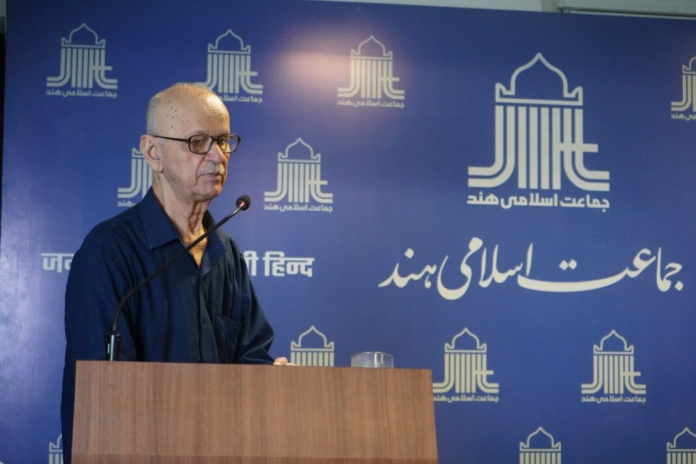New Delhi, August 6: Veteran journalist and strategic expert Qamar Agha has issued a grave warning about the potential for a broader conflict in the Middle East following recent Israeli attacks on Iranian targets. The situation has been further inflamed by the assassination of Hamas leader Ismail Haniyeh in Iran and Iran’s vows of retaliation.
Speaking at a program on “Ongoing Genocide in Gaza and the Question of Palestine” at the Jamaat-e-Islami Hind (JIH) headquarters, Agha emphasized the urgent need for international intervention to prevent further destabilization of the region. He pointed out that Israel’s historical pattern of striking its enemies irrespective of their location has previously led to operations in countries like Lebanon, Jordan, Egypt, and the UAE.
Agha outlined the significant American military movements in the region, including the deployment of naval ships and advanced fighter planes to Middle Eastern bases. He suggested that these preparations might indicate a massive air campaign against Iran, similar to the Iraq invasion, aimed at crippling Iran’s infrastructure.
Despite Israel’s overwhelming military superiority, Agha noted that it has failed to eliminate Palestinian resistance groups like Hamas, Hezbollah, and the Houthis. He emphasized their resilient nature and ability to regenerate even after significant setbacks, drawing parallels to historical conflicts where superior military forces failed to suppress resistance movements.
Agha also highlighted Iran’s rising influence in the region, attributing it to Iran’s refusal to recognize Israel and its support for resistance movements. This has intensified the geopolitical struggle, particularly with strong U.S. support for Israel driven by strategic interests, including oil and critical shipping lanes.
The expert also explored the roots of the recent Hamas attack on Israel, attributing it to the daily oppression faced by Palestinians and the potential recognition of Israel by Saudi Arabia through the Abraham Accord. He explained how Hamas, operating through a network of underground tunnels, launched a surprise attack on October 7, capturing about 250 hostages and causing significant casualties.
Agha asserted that the attack had positive outcomes for the Palestinian cause by halting the normalization of relations between Arab nations and Israel and reigniting global awareness about the Palestinian issue. He suggested that Israel’s plans for a “Greater Israel” were exposed as vulnerable, and the creation of a Palestinian state has become inevitable.
The ongoing conflict has also led to notable changes in American foreign policy and increased assertiveness in the Arab world. Saudi Arabia, in particular, has been advocating for a more independent foreign policy and has reestablished relations with Iran, leading to a realignment that has angered the U.S.
Agha’s analysis underscored the significant implications of the Hamas attack, suggesting that it has established the inevitability of a Palestinian state and challenged Israel’s long-term plans. He concluded by highlighting the historical context of the Israeli-Palestinian conflict and the strategic maneuvers by various nations over the decades.
The expert’s insights shed light on the complex and enduring nature of the Middle East conflict, emphasizing the urgent need for international efforts to address the ongoing crisis and its broader regional and global impacts.




